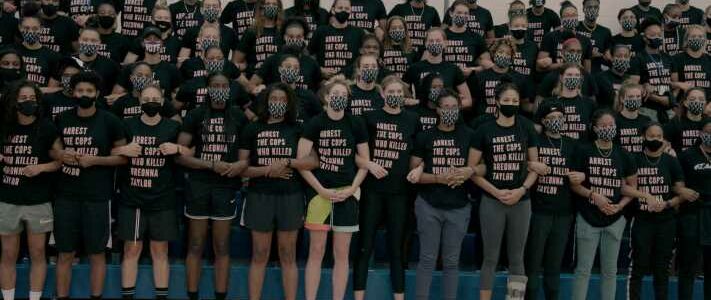
ESPN’s ‘144’ chronicles WNBA players’ bravery amidst racial reckoning, pandemic
With tears leaking from her eyes onto her mask-covered cheeks, Tiana Hawkins looked at her 5-year-old son, Emanuel, and uttered the words, “You wouldn’t understand,” as he asked her why she was crying. Hawkins, standing outside the basketball court, wearing a shirt with seven bullet holes sketched on the back, was faced with the reality of explaining to her young son what was transpiring inside the WNBA bubble after the Jacob Blake shooting in Wisconsin.
Hawkins of the Atlanta Dream was one of the 144 athletes inside the bubble at IMG Academy in Bradenton, Florida, who played a 22-game schedule from July to October 2020. The 147 total games were played with the backdrop of the COVID-19 pandemic and racial reckoning across the country.
These athletes lived and worked together, pushing their limits to complete the league’s unconventional season — a unique journey that was chronicled by ESPN in "144," a documentary that will premiere May 13 at 9 p.m. ET .
"For these women to be so authentic and open with us, is not a trust that we take lightly," Jenna Contreras, one of the directors, told USA TODAY Sports. "It was important to us to represent them as they are. They are strong. They are vulnerable. They had resilience in everything they did in this documentary.”
Contreras and Lauren Stowell's goals as directors were to cover five core topics: the season happening inside of a bubble, the pandemic, social injustice, mental health and motherhood. This was amplified because 80% of the league is Black.
Los Angeles Sparks forward and director Chiney Ogwumike, a two-time WNBA All-Star and multi-platform ESPN commentator, worked with the league, ESPN and producers to create "144," an in-depth look at the league’s 24th season.
“There was enthusiasm, and I think you know as a league that’s predominantly full of Black women, we knew that we had to make the most of this moment, having a camera there and showing the realities of what we were going through and what we were experiencing, because it’s bigger than us,” said Oguwmike.
Ogwumike believes that because she is a Black woman and WNBA player she was able to strip down barriers of athletes and the camera.
Although Ogwumike spent her summer outside the bubble, as the vice president of the WNBA player’s association, she made it her mission to amplify the players' work on the ground. This included going on "SportsCenter," "First Take" and "The Jump" and educating the audience on why these athletes should use their platform for activism.
Source: Read Full Article
